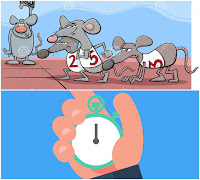Multitasking - How much is too much?
Life is a rat-race for most. A race against time, that we all wish to win. Especially when, we are all aware, that any moment, our breath may choose to stop infusing us with ‘life energy’. We are all swept along with the flowing tide, from birth, in a rush to satisfy our insatiable desires, while the stop watch begins its countdown. We adaptable humans, have adopted the practise of ‘multitasking’, to aid us in our endeavours.
What is multitasking?
Multitasking is a word, very much in vogue today, defined by the Oxford english dictionary as, dealing with more than one task at the same time. This term originated in the field of computer science initially, wherein computers were programmed to complete multiple tasks at the same time, and this was gradually extended to human application.
However, the practise is older than the word itself. Life without multitasking is unimaginable. Multitasking can be concurrent, wherein we perform multiple tasks at one time, or sequential, wherein we switch from one task to another.
A multitasking delinquent is scorned upon. We believe that it is a quality to be boasted about; So much so, that it is now most often seen as a desirable quality to have, in most job resumes! The more tasks we are able to juggle, the more efficient we are perceived.
It is not uncommon to see someone checking their phones, while talking to a friend, a movie running in the background, and some dull data from work being entered into the laptop at the side! The output includes a movie, which is vaguely understood, a half-hearted conversation, incomplete or incorrect data entry, with one hand distractedly swiping the phone screen, out of habit! A similar situation in the work-space would only result in unfinished chores, hordes of corrections, an anxious brain and a harried face, as you rush about with your attention fractured into a dozen pieces.
Myth of Multitasking
Most scientists believe that multitasking is a myth. The human brain is NOT wired to accomplish two different tasks at the same time. What we do instead, is shift focus quickly from one task to another or task-switching, which is controlled by an area called Brodmann’s area 10, in the frontal lobe of the brain1. Our brain stalls for milliseconds before we switch over to the next task2 , resulting in time-loss, which has been demonstrated by psychologist Rene Marois of Vanderbilt University.
Hence, multitasking translates into efficiency, only if we prioritise our tasks, and tackle them in order of importance, rather than letting our minds flit about without direction, responding to every distraction, that our surroundings offer. Focussed attention is the key here.
Multitasking - Boon or Bane?

Do you remember, two decades ago, when we didn’t have mobile phones, laptops and the internet beckoning to us at regular intervals? A simpler but efficient time. Achievers achieved even then, without gadgets available at their beck and call. Maybe, yesteryear’s uncomplicated life, is the answer to today’s chaos?
The practise of man engaging in more than one media activity at a time is called media-multitasking. It has its merits and has garnered immense importance to be pushed aside or ignored in
 the twenty first century; But overindulgence,without monitoring, may lead to deterioration of physical, mental, emotional and social health. Undeniably, technology is a necessity, has definitely made our lives easier and more entertaining, but it has also increased procrastination, decreased efficiency and is known to increase anxiety and depression in the general population, as evidenced by scientific research.3
the twenty first century; But overindulgence,without monitoring, may lead to deterioration of physical, mental, emotional and social health. Undeniably, technology is a necessity, has definitely made our lives easier and more entertaining, but it has also increased procrastination, decreased efficiency and is known to increase anxiety and depression in the general population, as evidenced by scientific research.3
Another study has demonstrated that the information learnt while multitasking is stored in a different area of the brain when compared to those who learn information when not distracted, hence resulting in difficulty in information retrieval in the former4.
Mindfulness, Meditation, and all things nice.
Recently, when I experienced panic attacks, prolonged anxiety, and related mood disturbances, I found relief by practising mindfulness and meditation, concepts that were novel to me.
Mindfulness refers to the non-judgmental awareness of experiences in the present moment.
- It is known to largely benefit people suffering from anxiety disorders, depression, substance abuse and eating disorders.
- It has also shown benefits in reducing blood pressure and cortisol levels, increasing immunity and overall physical and mental health.
Meditation is akin to a gymnasium for our minds. It helps to foster focus and attention, hence assisting us in effective task-switching and increased efficiency in performing our jobs5.
How did meditation help me? It helped me re-learn to focus attention on the task at hand, rather than let my mind wander helter-skelter, thus inviting anxiety and negativity. Practising mindfulness helped root me in the present. Both concepts combined, taught me appreciation of the present moment, helped me ignore distractions, prioritise and tackle tasks , and live life to the fullest.
Like everything else in life, the mantra, ‘practise makes perfect’, holds true for this as well.
Do you find yourself held slave to your gadgets?
Do you ‘multitask’ often, and yet, are unsatisfied with the results?
Do you wish for life to slow down?
Are you in the habit of rehashing events from your past?
Do you make elaborate mental movies of your unforeseeable future?
Are you a victim of anxiety and depression?
If you’ve answered in the affirmative for even one of the above questions, then please press pause on your life’s remote. Review. Give each moment its due. Take some time out for your physical and mental rejuvenation. Get back in motion with renewed energy and a resolve to give your complete attention to the present. Slow your pace, rather than risking a breakdown, before your time is due.
What are YOUR views on multitasking? How do YOU intend to de-stress, de-clutter and rejuvenate? Do tell!
If you have enjoyed reading my posts, do click on the 'vote for me at blogadda' tab on the right hand side, and show some love!
REFERENCES:
- Roca M, Torralva T, Gleichgerrcht E, Woolgar A, Thompson R, Duncan J, Manes F. The role of Area 10 (BA10) in human multitasking and in social cognition: a lesion study. Neuropsychologia. 2011 Nov 30;49(13):3525-31.
- Dux PE, Ivanoff J, Asplund CL, Marois R. Isolation of a central bottleneck of information processing with time-resolved fMRI. Neuron. 2006 Dec 21;52(6):1109-20.
- Becker MW, Alzahabi R, Hopwood CJ. Media multitasking is associated with symptoms of depression and social anxiety. Cyberpsychology, Behavior, and Social Networking. 2013 Feb 1;16(2):132-5.
- Foerde K, Knowlton BJ, Poldrack RA. Modulation of competing memory systems by distraction. Proceedings of the National Academy of Sciences. 2006 Aug 1;103(31):11778-83.
- Hölzel BK, Lazar SW, Gard T, Schuman-Olivier Z, Vago DR, Ott U. How does mindfulness meditation work? Proposing mechanisms of action from a conceptual and neural perspective. Perspectives on psychological science. 2011 Nov;6(6):537-59.
- Rosen C. The myth of multitasking. The New Atlantis. 2008 Apr 1(20):105-10.









Very nice read! Multi-tasking is overrated.
ReplyDeleteTrue! We place so much emphasis on the concept of multitasking, that we lose precision and thoroughness in the activity that we are involved in; And it doesn't necessarily ensure gain in time, rather the opposite!
Delete